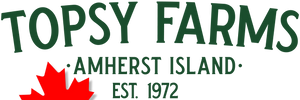The Wool Shed is open Friday to Sunday from 10-4, and by appointment the rest of the week
Permaculture at Topsy Farms
Posted on
We practice permaculture at Topsy Farms because it makes sense. The shallow land and Island context sets limits to what works without damage or erosion.
The farm we bought in 1971 is located on the west end of Amherst Island in Lake Ontario. The shallow, drought-prone soil is best used for forage. We keep the sod cover intact, not ploughing, using the sun and moisture-retaining soil to turn the natural grass and legume forage into meat. The farm is wooded with mixed trees, naturally self-planting.
Permaculture means we work to enhance what exists here, naturally.
WATER:
We’ve deepened low-lying areas, making ponds for the sheep flock in many of the fields.
Living on an Island, we have easy access to a great volume of water.
It is our job to ensure we keep it clean.
We either pump water from the lake or a deep well, through the people and animals, then back into the soil.
LAND:
Our woodlot is about 100 acres – more than enough to supply firewood and some fence posts without ever cutting a live tree. We burn fallen and dead trees in the wood furnace, the primary source of heat in our house.
We’ve made some lumber from standing dead timber, using a rented portable small saw mill on the farm. Even the off-cuts aren’t wasted – we use them for the structures of our compost piles.
We harvest wild mushrooms, nuts, nettles and other wild edibles. We tend our own bees on our land, ensuring they aren’t within range of pesticides so we consume and sell our own honey. Each house grows most of its own fresh food, and we consume mainly our own meat chickens and lamb or young mutton. We also eat venison, taken by license on our own property.
We’ve inherited and enhanced good fence rows – trees and bushes that separate fields. We planted a hedge of spruces (those most likely to survive here) that provides winter windbreak and summer shade.
All our properties have fruit trees, and some deciduous trees that we’ve planted. Our grandsons are involved in the gathering, making, and consuming quantities of pears and pear and apple sauce, and elderberries from our prolific bush, frozen, then eaten all winter.
SOIL:
We trim pastures rather than spraying for weed control. We do not plow.
Our farm has improved soil quality over the years by unrolling hay bales on the fields – “sheet composting” – which spreads the manure naturally. This technique feeds the soil’s earthworms and microorganisms. We also gather and compost manure from barnyards, then spread it on the fields.
REUSE, RECYCLE:
We mulch under bushes and near our Wool Shop with belly wool – a waste byproduct of shearing. https://www.youtube.com/watch?v=z3v0WTZLrpk Some garden areas are mulched by unrolling old hay bales, no longer desirable for the sheep. This provides a very effective thick ground cover, adding nutrients for the soil as it breaks down and aiding moisture retention.
We recycle extensively, from batteries to bale wrap to used motor oil. We scavenge old tractors for parts. We even reuse the string wrapped around each bundle of yarn we receive.
The shearing area on the second floor of the barn was built of wood salvaged when we were asked to demolish an old Island grain elevator. Seven miles of wood went far.
We make products from our yarn; the leftover bits form the core of dryer balls, the small tads cut off are added to the nesting materials, combined with belly wool, for birds in spring. Everything is used.
Raising sheep was a logical decision, given the shallow soil. Originally chosen as a source of meat sales, family food and revenue, we couldn’t make a living for 2 families. The lamb, yearling, and mutton are in high demand, but the prices aren't. We turned the health necessity of annual shearing into revenue by having the raw wool processed in PEI. We now provide almost 1/3 of the farm income through sales of pure wool blankets, yarn, sheepskins, and other wool products. Our honey bees thrive in the pollen-producing environment, giving tasty, healthy honey.
Our desire is to improve the farm’s finances to enable the next generation to take the farm over and to have a good life.
Customer Care
About Topsy Farms
Contact us
14775 Front Road Stella, ON, K0H 2S0
(613)-389-3444 x1
1(888)-287-3157 toll-free
info@topsyfarms.com

Leave a comment: